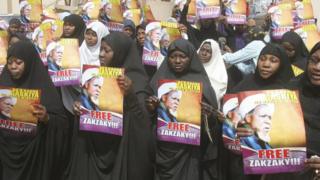Investigating clashes between Nigeria’s Shia and the army
Eyewitnesses have told the BBC that the Nigerian army has killed dozens of members of a Shia organisation during a military crackdown last month – something the army denies. The BBC’s Nigeria correspondent Martin Patience travelled to their headquarters in Zaria to investigate.
Driving through some of the city’s quiet streets, it was hard to imagine that just a month ago they were a battleground.
But if you looked carefully you could spot bullet holes in some of the buildings, just a few hundred metres from the campus of the city’s university.
What triggered the violence is disputed.
The Nigerian army released a video showing members of the Shia Islamic Movement of Nigeria (IMN) blocking the convoy of the army chief Gen Tukur Yusuf Buratai.
The video shows an officer pleading with members of the IMN to allow the convoy to pass.
The military then accuse the Shia group of trying to carry out an assassination attempt.
That is denied by the IMN, which says the army used it as an excuse to carry out a “pogrom” – or organised massacre – of their members.
A Human Rights Watch report said the Nigeria’s army version of events “does not stack up” and says at least 300 people were killed, many of them buried in mass graves.
The US-based rights group said: “At best it was a brutal overreaction and at worst it was a planned attack on the minority Shia group.”
The army dismissed the claims as “unsubstantiated”.
The ISM is a pro-Iranian organisation, which has tens of thousand of followers.
It is led by the charismatic figure of Sheikh Ibrahim Zakzaky who was shot and then detained during the crackdown.
He remains in custody but has not been charged.
Nigerian officials accuse the group of wanting to ferment an Iranian-style revolution and of being a “state within a state” – accusations IMN denies.
Sheikh Zakzaky has periodically been incarcerated for alleged incitement and subversion.
In 2013, three of his sons were killed in clashes between the army and pilgrims in a religious procession.
During the crackdown last month, the military stormed the group’s sprawling mosque complex, which was later razed to the ground along with the sheikh’s house.
We spoke to one 16-year-old boy who was inside the mosque compound when it was stormed. He did not want his identity revealed, fearing government reprisals.
I met him in a hospital where he was receiving treatment for gunshot wounds. Sitting on a bed, he nursed his heavily bandaged hand. He told me one of his brothers had been killed in the clashes.
He said there was a standoff between Shia members of the group and the army that lasted for hours.
“We were under siege. The military made an announcement through loudspeakers calling us to come out with hands in the air,” he told me.
“But we were advised by our leaders not to go out.
“They said the army would shoot us dead if we did.”
Late in the evening, the army stormed the compound. The 16-year-old accuses the military of carrying out atrocities.
“The soldiers broke down the door of a room where people were receiving medical treatment,” he said.
“They went in and started shooting.
“They killed everyone in the room and then set some of the bodies on fire. “
The teenager says he was only spared because of his age.
In response to the allegations, a Nigerian military spokesman told the BBC that “soldiers followed proper rules of engagement at all times”.
Following the crackdown, the IMN says that more than 700 of its members are missing – either dead or detained.
The organisation has called on the authorities to release their members.
One of those desperately waiting for news is Jummai Ahmad Karofi, whose three sons are all missing.
“I just hope they are alive,” she told me. “I don’t feel in my heart they are dead. I don’t know whether they’ve been shot, I just don’t know.”
But there remain many unanswered questions – and the repercussions of what happened in Zaria could be serious.
Once again, the Nigerian army stands accused of human rights abuses.
The country’s Islamic spiritual leader, the Sultan of Sokoto, has also warned the crackdown could spark a fresh insurgency.
And with Nigeria currently fighting the Sunni Islamist militant group Boko Haram, that would be a disaster for the country.
Source: Read Full Article



